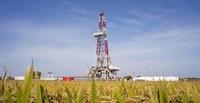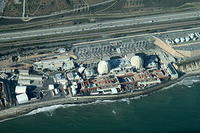-
Newark to raise water rates to pay for infrastructure

A report presented to Newark’s city council said that the town’s water and sewer rates will be increased by more than 60 percent over the next ten years in order to pay for $500 million in infrastructure repairs to the town’s faulty and outdated meters, century-old, leaky pipes, and broken valves.
-
-
Natural gas from fracking, coal have similar energy return on investment (EROI)
The value of a fuel’s long-term usefulness and viability is judged through its energy return on investment, that is, the comparison between the eventual fuel and the energy invested to create it. A new study finds that shale gas has a return value which is close to coal.
-
-
Risk assessment of shale gas fracking to biodiversity

Fracking, the controversial method of mining shale gas, is widespread across Pennsylvania, covering up to 280,000 km² of the Appalachian Basin. New research explores the risks posed to biodiversity including pollution from toxic chemicals, the building of well pads and pipelines, and changes to wetlands.
-
-
Texas to appeal FEMA decision not to declare West, Texas a disaster area
The Federal Emergency Management Agency (FEMA) said President Obama would not declare West, Texas a disaster area in the wake of the massive fertilizer plant explosion there two months ago, and Texas governor Rick Perry is not happy. FEMA said Texas did not make the case the state lacked funds for cleanup and recovery efforts.
-
-
New Jersey faces costly water infrastructure upgrades

Before Hurricane Sandy hit New Jersey, state officials knew they had much work ahead of them to update the state’s water infrastructure. The damage Sandy inflicted only highlighted the inadequacies of New Jersey’s outdated wastewater, stormwater, and drinking water infrastructure. Upgrading the system will be costly, but not doing so will be costlier.
-
-
Increased U.S. crude oil production leads to dramatic fall in oil imports
The U.S. Energy Information Administration (EIA) issued its Annual Energy Outlook 2013 (AEO2013), which shows that under the assumption of crude oil production of about ten million bbl/d between 2020 and 2040 – which means total U.S. liquid fuels production (which includes crude oil, natural gas liquids (NGL), refinery gains, biofuels, and other liquid fuels) of more than eighteen million bbl/d in 2040 – net import of oil drops to 7 percent or less of total demand compared to 40 percent in 2012.
-
-
Defense companies turn their attention to border security

The U.S. involvement in the Iraq war is over, and the country will soon withdraw its troops from Afghanistan. Federal budgets cuts shrink agencies’ ability to conduct research and development. Faced with these realities, military contractors have begun to focus on border security. What many defense companies find especially appealing is the fact that the Senate immigration bill conditions any move toward legalizing the status of more than eleven million illegal immigrants in the United States on the strengthening of security along the U.S.-Mexico border.
-
-
House panel to unveil cybersecurity bill
Republicans on the House Homeland Security Committee are close to finalizing a long-awaited cybersecurity bill, following extensive discussions with private companies.The bill formally establishes DHS’s already-operating National Cybersecurity and Communications Integration Center, to circulate cyberthreat and vulnerability data.
-
-
ACLU files lawsuit challenging NSA's phone surveillance
In the wake of the past week’s revelations about the NSA’s surveillance of phone calls, the yesterday American Civil Liberties Union (ACLU) filed a lawsuit charging that the program violates Americans’ constitutional rights of free speech, association, and privacy.
-
-
Making jet fuel from switchgrass

The Energy Department’s National Renewable Energy Laboratory (NREL) is partnering with Cobalt Technologies, U.S. Navy, and Show Me Energy Cooperative to demonstrate that jet fuel can be made economically and in large quantities from a renewable biomass feedstock such as switch grass. The project could spur jobs in rural America, lead to less reliance of foreign oil.
-
-
California’s San Onofre nuclear power plant retired due to safety concerns

Southern California Edison (SCE) has decided it will retire the San Onofre nuclear power plant located on the California coast. The decision comes after officials debated for over a year whether the twin reactors could be safely restarted. The power plant is located in a populated area, with millions living near it.
-
-
Insurers face minimum $4 billion payout from May U.S. storm damage
Total economic losses from the Oklahoma tornado – in fact, the event comprised at least sixty-one confirmed tornado touchdowns — are preliminarily estimated at $5.0 billion, amid insured losses of at least $2.5 billion. Total economic losses from flash flooding in the Plains and Midwest, and from damaging winds in the Northeast, are expected to exceed $2.0 billion, with insured losses above $1.0 billion.
-
-
Studying rare Earth elements in Alaska may help make them less rare
A unique deposit of heavy rare Earth elements (REE) at Alaska’s Bokan Mountain could help scientists understand how rare Earth element deposits form, according to new research. Rare Earth elements are important, but scarce, elements used in components in many cutting edge electronic and defense technologies.
-
-
Smarter energy use by industry could cut U.K. electricity demand by 75 percent
As the U.K. government debates the U.K. Energy Bill, new research has found that turning down non-essential services, such as heating, air-conditioning, and pumping equipment, at times of peak electricity demand could play a far greater role in helping the United Kingdom achieve future energy security.
-
-
BugBuster automatically finds bugs in applications
To overcome problems associated with using Web sites, problems which range from the annoying to those which inflict severe financial pain on large companies, a Swiss start-up has developed the first intelligent tool which finds out on its own how to interact with an application whose code it tests according to various possible scenarios.
-
More headlines
The long view
Factories First: Winning the Drone War Before It Starts
Wars are won by factories before they are won on the battlefield,Martin C. Feldmann writes, noting that the United States lacks the manufacturing depth for the coming drone age. Rectifying this situation “will take far more than procurement tweaks,” Feldmann writes. “It demands a national-level, wartime-scale industrial mobilization.”
Trump Is Fast-Tracking New Coal Mines — Even When They Don’t Make Economic Sense
In Appalachian Tennessee, mines shut down and couldn’t pay their debts. Now a new one is opening under the guise of an “energy emergency.”
Smaller Nuclear Reactors Spark Renewed Interest in a Once-Shunned Energy Source
In the past two years, half the states have taken action to promote nuclear power, from creating nuclear task forces to integrating nuclear into long-term energy plans.
